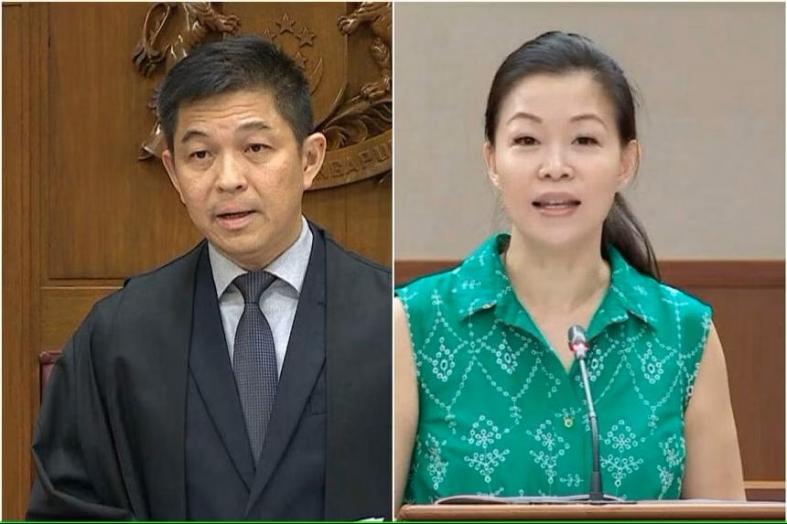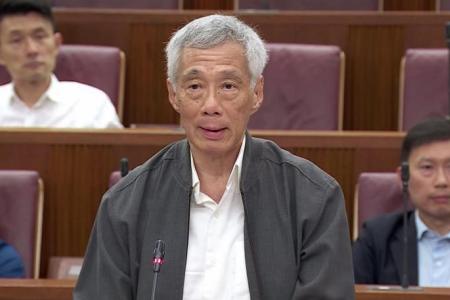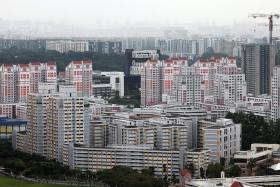‘I should have forced the issue sooner’: PM Lee explains approach to Tan Chuan-Jin, Cheng Li Hui affair
Prime Minister Lee Hsien Loong acknowledged on Wednesday in Parliament that he should have acted earlier on the affair between former Speaker of Parliament Tan Chuan-Jin and former People’s Action Party (PAP) MP Cheng Li Hui.
In his ministerial statement, he said that he had been asked why he took so long, more than two years, to act.
“It is a fair question. In retrospect, and certainly now, knowing how things eventually turned out, I agree. I should have forced the issue sooner,” he said.
He added that by giving the matter some time, he had hoped to give them a softer exit, and save them and their families the pain and embarrassment they are suffering now.
“I placed much weight on protecting their families – perhaps too much,” said PM Lee.
“Regrettably, in the end Mr Tan and Ms Cheng did not stop the affair, and both had to go. On reflection, as I said, I should have forced the issue earlier, certainly before midterm,” he added.
Parliament had gone into recess at the end of March, marking the middle of its five-year term. It resumed after two weeks, on April 10.
On Wednesday, PM Lee described the facts of the incident between Mr Tan and Ms Cheng.
He had first learnt of their relationship in November 2020, some time after the general election.
The pair were spoken to and counselled separately, and both said they would stop the affair, which they did not.
“Most recently in February 2023, I spoke to them again, separately. Mr Tan admitted that what he did was wrong. He offered to resign. I accepted, but I told him that before he actually resigned, I had first to make sure residents in Kembangan-Chai Chee, his ward, and Marine Parade, his GRC, were taken care of,” said PM Lee.
PM Lee said he wanted to explain his general approach, as well as his thinking at that point in time.
These sorts of relationships happen from time to time, he said.
They have happened in the past, and no doubt will happen again in the future. In such cases, what is done depends on many factors – the circumstances, how inappropriate or scandalous the behaviour was, and the family situations, said PM Lee.
“We also have to be conscious of the impact on innocent parties – particularly the spouses and children… This is not a new position – it reflects the PAP’s longstanding practice, since the days of Mr Lee Kuan Yew,” he said.
He added that there is no single template that applies to all extramarital affairs, but there can be at least three situations.

First, where the individuals involved will be talked to, and if they stop, the matter ends there and no further action is needed.
Second, where immediate action has to be taken – for example, if one of the individuals has supervisory power over the other.
PM Lee noted that the party had in the past taken immediate action in a few cases.
In 2012, then Speaker of Parliament Michael Palmer resigned just days after he came clean about his extramarital affair.
Third, where the relationship raises some questions of propriety, beyond it being an extramarital affair.
The individuals will be talked to, but the matter cannot end there, said PM Lee.
Even if the affair stops, some action has to follow – but what that action is and when it is taken depends on the nature of the facts and the boundaries transgressed, he said.
“The present situation falls into this third category. It’s wrong. Mr Tan and Ms Cheng had to stop their affair. I told them to stop.”
PM Lee asked members to consider if they would object to having a Speaker married to an MP, in deciding what more should be done in the incident involving Mr Tan and Ms Cheng.
“I think the answer is no – that would be perfectly all right. There is no direct reporting line between the Speaker and an MP. Thus, an open, legitimate relationship between the Speaker and an MP is not in itself objectionable,” he said.
Thus, this situation of a Speaker having an affair with an MP does not fall into the category where immediate action has to be taken.
But the Speaker has some official capacity vis-a-vis MPs, said PM Lee.
“An extramarital affair between him and an MP is therefore problematic. It puts other MPs and staff in an awkward position, and it is just not proper,” he added.
PM Lee said that after he spoke to Mr Tan in November 2020, he was told that the relationship would end, and he took it to be so.
He therefore felt there was some leeway to take some time to decide what further steps to take.
One possible action that could have followed would have been, should the affair have stopped, that PM Lee would ask Mr Tan to step down as Speaker some time before the end of the term, in a way that would reduce the public embarrassment to him and his family.
“As to whether one or both should also resign as MPs – I hadn’t decided at that time, but quite likely both would have had to leave at some point,” he said.
PM Lee added a “personal plea” that while there was no doubt the two of them had behaved improperly, there are also innocent family members involved.
“Likewise for the case involving a former member across the aisle, in the Workers’ Party. All their families are suffering,” said PM Lee, referring to the affair between former Aljunied GRC MP Leon Perera and former senior party member Nicole Seah.
Mr Perera and Ms Seah resigned from the party after initially lying about their affair, Leader of the Opposition Pritam Singh said in a press conference in July.
PM Lee said on Wednesday that he hoped MPs and the public could empathise and have compassion for the families, and give them the privacy and space they need to heal.
He noted that there had been a great deal of public interest over the recent series of incidents, with the Corrupt Practices Investigation Bureau (CPIB) arresting and investigating Transport Minister S. Iswaran, the resignation of two MPs, and the allegations on the Ridout Road rentals.
“The way we have handled these incidents shows how seriously the PAP takes our responsibility of governing Singapore, and being accountable to Parliament and to Singaporeans,” said PM Lee.
He assured MPs that when such issues come up, the party will deal with them properly and transparently, as it has done.
On the issue of CPIB’s investigation involving Mr Iswaran, when the bureau discovered on its own that it had reason to arrest and interview a minister, it opened a formal investigation.
“Nobody tipped them off. There had been no public scandal. CPIB came across something that needed investigating, and proceeded to do their job,” he said.
On the issue of the PAP MPs’ affairs, he added: “We took some time to sort it out, probably longer than we should have. But we did what we needed to do, and put the situation right.”
The CPIB had also earlier thoroughly investigated ministers K. Shanmugam and Vivian Balakrishnan on the Ridout Road rentals, and found no wrongdoing on their parts.
These incidents show two aspects of how the PAP government works, said PM Lee.
One, when there is a suspicion or allegation of wrongdoing in the discharge of official duties, especially possible corruption, there is zero tolerance.
Two, when people slip in their personal lives, the PAP will look at the facts of each case carefully, and deal with the matter as humanely and sensitively as possible, according to the principles the party has established, he said.
“Systems are composed of human beings. In any system, however comprehensive the safeguards, sometimes something will still go wrong. The PAP Government does our utmost to minimise that possibility,” said PM Lee.
He added that the party works hard to identify the right people to bring into politics and appoint to responsible positions. They are vetted carefully, tested and stretched, before they are entrusted with heavier responsibilities.
Often they measure up, but sometimes they fall short. Occasionally they transgress norms of conduct, or commit wrongdoing, he said.
He noted that Singapore has seen corruption cases involving political office-holders in the past, including Mr Teh Cheang Wan, former minister for national development, in 1986; and Mr Phey Yew Kok, former MP and president of the National Trades Union Congress, in 1979.
“All these cases were handled by Mr Lee Kuan Yew who was then prime minister – thoroughly, transparently, and applying the full force of the law. That is still how the PAP Government deals with such cases. It’s not changed under my charge; and it won’t under my successor either,” said PM Lee.
He assured Singaporeans that the party would protect the integrity of the system of government.
“For the good of our country, we will carry through what needs to be done in accordance with the law, even if it may be politically embarrassing and painful to the party. I will not flinch or hesitate to do my duty, to keep our system robust and clean.”
He acknowledged that the PAP had taken a hit with the investigation into Mr Iswaran, and the resignations of two MPs.
He said: “But we will show Singaporeans that we will uphold standards and do the right thing, so that trust is maintained, and the Singapore system continues to work well.
“This is my approach, and I am confident it will be my successor’s approach too. And this is how we will keep Singapore safe, strong and prosperous for many years to come.”
Get The New Paper on your phone with the free TNP app. Download from the Apple App Store or Google Play Store now


